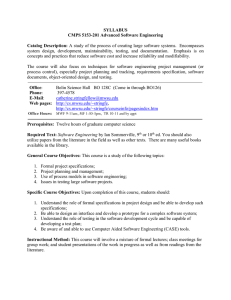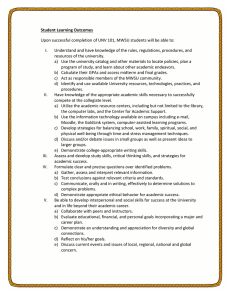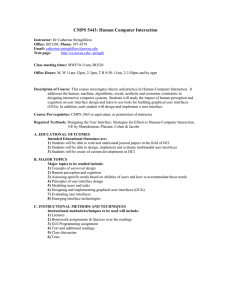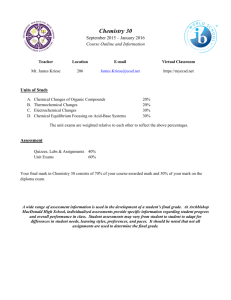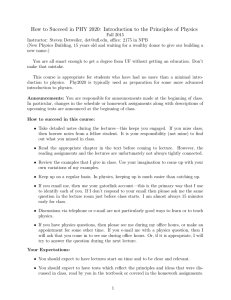SYLLABUS CMPS 5443 Software Quality Assurance Catalog Description:
advertisement
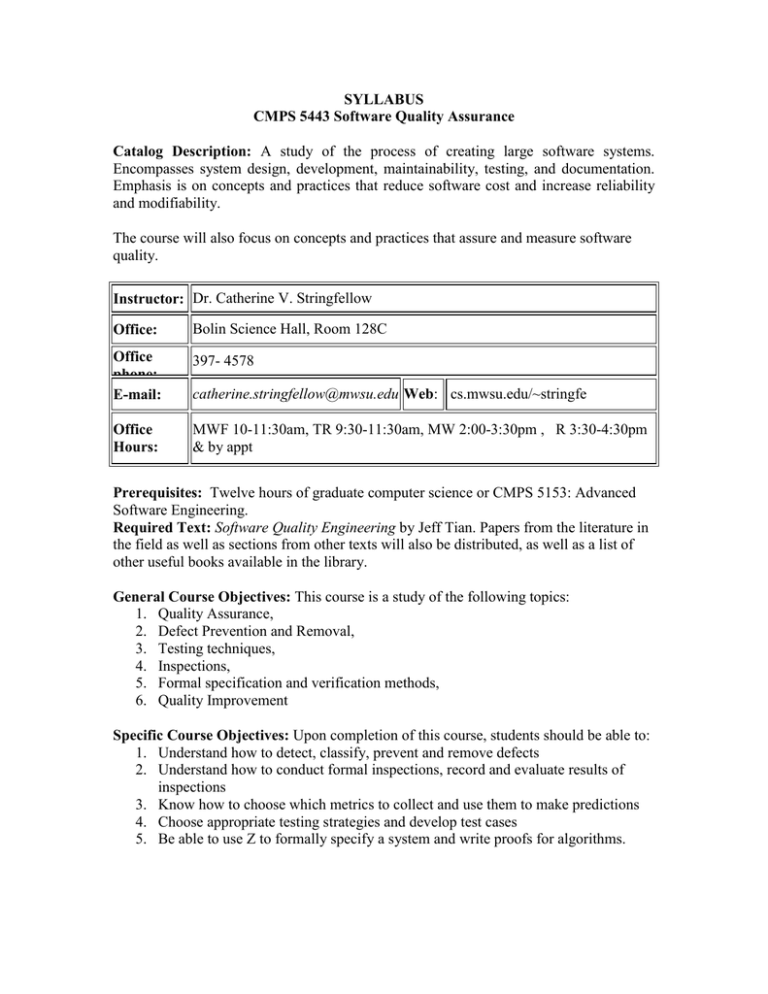
SYLLABUS CMPS 5443 Software Quality Assurance Catalog Description: A study of the process of creating large software systems. Encompasses system design, development, maintainability, testing, and documentation. Emphasis is on concepts and practices that reduce software cost and increase reliability and modifiability. The course will also focus on concepts and practices that assure and measure software quality. Instructor: Dr. Catherine V. Stringfellow Office: Bolin Science Hall, Room 128C Office phone: E-mail: 397- 4578 Office Hours: MWF 10-11:30am, TR 9:30-11:30am, MW 2:00-3:30pm , R 3:30-4:30pm & by appt catherine.stringfellow@mwsu.edu Web: cs.mwsu.edu/~stringfe Prerequisites: Twelve hours of graduate computer science or CMPS 5153: Advanced Software Engineering. Required Text: Software Quality Engineering by Jeff Tian. Papers from the literature in the field as well as sections from other texts will also be distributed, as well as a list of other useful books available in the library. General Course Objectives: This course is a study of the following topics: 1. Quality Assurance, 2. Defect Prevention and Removal, 3. Testing techniques, 4. Inspections, 5. Formal specification and verification methods, 6. Quality Improvement Specific Course Objectives: Upon completion of this course, students should be able to: 1. Understand how to detect, classify, prevent and remove defects 2. Understand how to conduct formal inspections, record and evaluate results of inspections 3. Know how to choose which metrics to collect and use them to make predictions 4. Choose appropriate testing strategies and develop test cases 5. Be able to use Z to formally specify a system and write proofs for algorithms. Instructional Method: This course will involve a mixture of formal lectures; class meetings for group work; and student presentations of the work in progress, as well as from readings from the literature. Course Assignments and Evaluation: Students will be asked to perform software quality assurance activities on different pieces of software. There will also be a few short assignments involving formal specifications, proof of correctness, developing test cases, applying prediction models, and other course topics. There will also be a midterm and final. Final grades will be based on the following criteria. Activity Percentage of Grade Midterm 20% Final 30% Assignments (Homework, Quizzes, Group Work) 50% Grading Scale is as follows: 90-100% is an A, 80-89% is a B, 70-79% is a C, 60-69% is a D, and 0-59% is an F. Late assignments will result in a lower grade. Makeup Exams and Quizzes: There are two exams. The only acceptable reason for missing an exam is with a valid university excuse (e.g., excuse from the doctor, death in the immediate family, etc.) A makeup exam will only be to those students who have a valid excuse. If you know ahead of time that you will miss an exam, please see me to take it early. Academic Dishonesty: It is dishonest to ask for, give, or receive help in examinations or quizzes, to use any unauthorized material in examinations, or to present, as one’s own, work or ideas which are not entirely one’s own. The instructor has the right to expect that all student work is honest, original work. As students of Midwestern State University you must accept and acknowledge that responsibility for lying, cheating, stealing, plagiarism, and other forms of academic dishonesty fundamentally rests within each individual student. Academic dishonesty procedures and sanctions that may be imposed are spelled out in Section 4 of the Student Handbook. Each student is responsible for understanding all the material in the Student Handbook, which may be obtained at www. students.mwsu.edu/dean. Tentative Sequence of Topics week 1 2 3 4 5 6 7 8 9 Software Quality Quality Assurance Testing Concepts and Issues Testing Activities Testing Techniques Testing Techniques. Other Techniques Defect Prevention/Process Improvement In-class group assg; Midterm Inspection 10 CRC SuppMaterial 11 Refactoring Quality Models and Measurements; Software Reliability Engineering Defect Classification and Analysis Formal Methods Formal Specification FINAL Tuesday, May 8, 8-10pm SuppMaterial 12 13 14 15 16 topics chapter 1-3 3-5 6 7 8, 9, 11a 13 Some project activities In class questions/paper Musa’s OP Black Box Testing CFG and CFT Testing 14 19; 22 20 15 Handout Inspection MtMLs; CAPJKE SRGMs; Presentations; SRGM Video; NTASC Z
